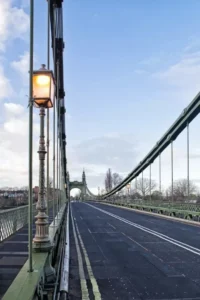Transport Secretary Grant Shapps did not break the law when approving the government’s second Road Investment Strategy (RIS2), a high court judge has ruled.
In the High Court, Mr Justice Holgate dismissed Transport Action Network’s (TAN’s) application for a judicial review on environmental grounds. In making his decision he concluded that approval of RIS2 was in line with legal obligations.
The legality of the government’s second Road Investment Strategy (RIS2) was subject to a two day High Court hearing last month.
The investment plan, approved in March 2020, includes £14.7bn worth of road route upgrades between 2020 and 2025. The Lower Thames Crossing and the Stonehenge Tunnel are among the major projects are due tol get underway by 2025, reports New Civil Engineer.
Campaigners from Transport Action Network (TAN) brought the claim, which accused Shapps of breaking the law when approving the £27.4bn RIS2. TAN’s main argument claimed that Shapps had failed to consider the plan’s effect on the environment.
The High Court claim states that there was a failure to take into account the UK’s net zero carbon emissions target as well as the Paris Climate Agreement. It adds that the government failed to carry out a Strategic Environmental Assessment of RIS2.
The claim also used the Friends of the Earth Ltd v Secretary of State for Transport [2020] case as a precedent for blocking RIS2. In that instance, the Court of Appeal overturned the government’s Airports National Policy Statement ruling that it had failed to consider the Paris Climate Agreement, effectively putting an end to Heathrow’s expansion plans.
Mr Justice Holgate ruled that the “briefing, albeit laconic, was a legally adequate precis”, holding that “on matters of political and economic judgment a claimant for judicial review bears a heavy evidential onus to establish that a decision was irrational, absent bad faith or manifest absurdity”.
He also rejected TAN’s claim that a RIS is an environmental decision-making document. Instead he ruled that it is “essentially a high-level investment strategy” and that there are “other mechanisms by which carbon emissions from the transport sector are monitored and assessed”.
He added: “The government is taking a range of steps to tackle the need for urgency in addressing carbon production in the transport sector. Whether they are enough is not a matter for the Court.”
In response to the ruling, TAN director Chris Todd said he was shocked.
He added: “In a month of unprecedented fires and floods, the effect of this judgment is to prioritise the ‘stability and certainty’ of the roads over that of our climate.
“The judgment has failed to grapple with the clear requirement created by Parliament that ministers must carefully consider environmental impacts. He reasoned that the more important the decision, the less a court should be willing to scrutinise decision-makers. This will surely send shivers down the spine of anyone hoping for urgent action on climate.
“Even if rising waters were lapping at the steps of the courts and Whitehall, it appears scrutiny of government climate decisions would still be side-stepped. As the quickening pace of global heating threatens the rule of law, we need legislation upheld rather than ministers let off the hook.”
The DfT’s official response dismissed the claim as “wrong […] misconceived and wholly unarguable”.
In its official response to the Planning Court – obtained by NCE – the DfT uses its defeat in court of TV presenter Chris Packham’s claim against HS2 Ltd as precedent for refusing the Transport Action Network’s claim for a Judicial Review.
A DfT spokesperson added: “We welcome the court’s judgement, which has found that our approach to assessing the carbon impacts of our road investment strategy was entirely lawful.
“Decarbonising transport is one of our main priorities and earlier this month we published our transport decarbonisation plan setting transport on the path to achieving net zero by 2050.”
The Dft’s transport decarbonisation plan commits the government to reviewing the National Networks Policy Statement (NNPS), which effectively underpins road investment and planning policy within the UK.
Shapps has confirmed that the review will not be concluded until Spring 2023, meaning road schemes earmarked for construction before then will continue as planned. Planning officials have been instructed to use the existing policy statement as guidance when examining planning applications during the next two years.
The current NNPS was written up in 2014 before the government’s legal commitment to net zero was announced, and before the publication of the government’s 10 Point Plan for a Green Industrial Revolution, its Sixth Carbon Budget and the transport decarbonisation plan.
The Transport Action Network therefore claims that it is “unacceptable” to keep it in use for the next two years.
In June, a separate High Court challenge was also heard in relation to the planning permission granted for the Stonehenge Tunnel scheme. The judge in that case has yet to reach a verdict.
That case specifically focuses on the legality of the scheme’s development consent order, granted by transport secretary Shapps despite the Planning Inspectorate’s recommendation that the planning application be thrown out.
A version of this story was originally written by Rob Horgan at New Civil Engineer.
























